There is a quiet intensity to Sid Sethi when we meet at the headquarters of his business Specscart.
Yet while drive is a trait common to most – if not all – successful entrepreneurs, you’d be hard-pushed to find a founder as courteous as the one taking on the might of Specsavers.
The warmth extends to his team. Before our rendezvous, they tighten up my current frames and administer my first eye test in several years – yes, I should know better – all for no charge.
There is no preferential treatment of the media here, however: anyone who wanders into one of his three shops is entitled to the same service. “Imagine if all retailers are superheroes,” Sethi tells me in his office later. “We want to be Spider-Man, the friendly neighbourhood eyewear store.
“You must give people an experience: we would never charge for tightening a screw, cleaning someone’s glasses or giving them an eye test.”
Away from the showroom, an exploration of the renovated bank building close to Bury’s iconic market reveals an incredibly efficient production line which is fulfilling 300 online orders a day from Specscart’s fast-growing website, with a next-day service guaranteed.
This is no mean feat: the main eyewear chains can take as long as 2-3 weeks to complete an order, which is what prompted Sethi to launch Specscart in the first place.
The entrepreneur from Delhi, India, had come to The University of Manchester to complete his Masters and was busy revising for a key exam when disaster struck: three days before his corporate accounting exam his glasses broke, leaving him “as blind as a bat”.
As well as the long lead time, he was gobsmacked to be quoted prices between £150-£600. “At that time, an iPhone 6 cost the same amount of money!” he tells me. “When I looked beneath the surface, I realised that the industry was dominated by a small monopoly of companies.”
So how did Sethi, who last year was included in Forbes 30-Under-30 list as well as BusinessCloud’s Northern Leaders Futures list, build Specscart from an idea in 2017 to the £5m turnover business of today?
Through tech, original thinking and sheer hard work.
First steps
First of all, he needed to understand the industry that he was looking to enter: so he went backpacking around China and visited several factories to find out how frames and lenses are made.
Upon his return, the first Specscart store – long before the business made its glasses in-house – was opened in the Salford town of Walkden, filled with stock purchased on his travels. This was made possible after Sethi won the Albert Gubay Enterprise Award, awarded in memory of the late Kwik Save, Total Fitness and property tycoon.
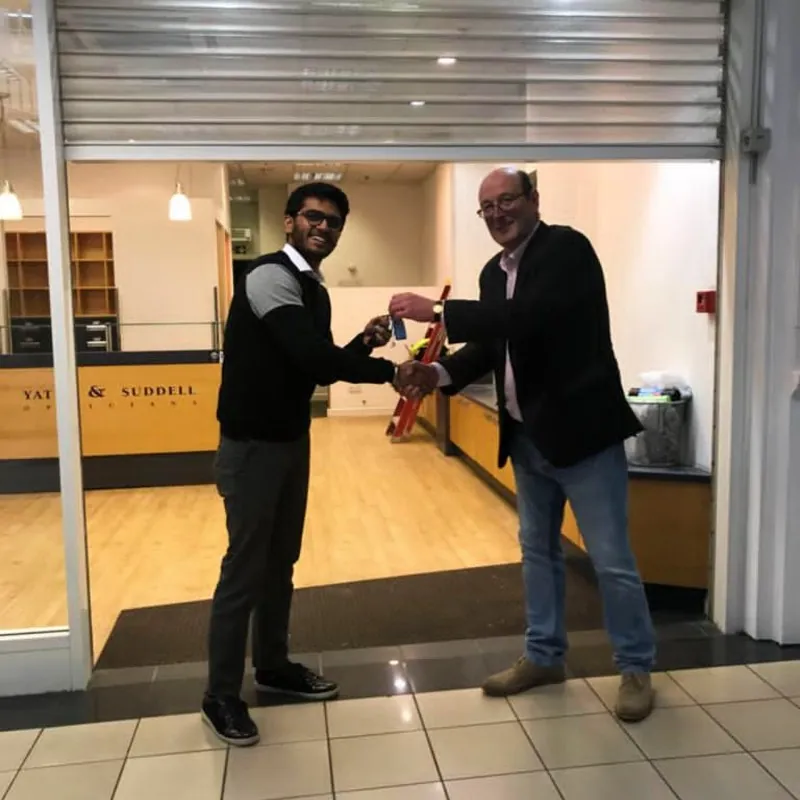
Sid Sethi handed keys to first Specscart store in Walkden
“The prize money was £5,000 in cash and an additional £5,000 to renovate a shop they gave us,” explains Sethi. “Walkden town centre has two sides: one is completely rundown and is now being demolished because there are no longer any shops there. They gave us a shop on the rundown side: to me, it was gold dust!
“I was a little bit emotional; and very hesitant and introverted. I was like: ‘Can I talk to people? How do I sell stuff?’
“No one used to pass by the shop; but on the second or third day a very elderly lady came in, pulling a shopping trolley behind her, and asked me for a bunch of leaflets. I asked her why and she said: ‘Because you’re a new business, and I want to support you.’
“To see the support of the community for a local business was really a lightbulb moment for me.”
Despite rent and bills being covered for the first two years by the University of Manchester – where Sethi had completed his Masters in international business and management – the first months were a struggle.
“Sales were £534 for the first month, and my flat’s rent was £500. So I was like: ‘How do I eat?’ That was honestly a hard time.”
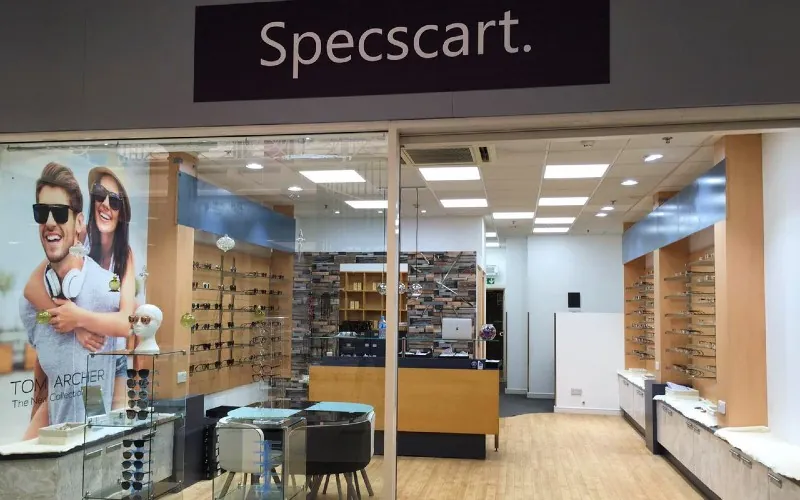
Specscart store in Walkden
Inspiration would arrive in the form of his father, who visited from India in December 2017.
“He’s a contractor over there, he makes furniture,” says Sethi. “He told me that when he started out, he used to sell cement to shops from his scooter. He said: ‘You’ve got all these frames in here. Why don’t you do wholesale?’ So all of a sudden I have to become a salesman! I have to knock on people’s doors and walk into their shop!
“I told him I couldn’t do it. So this man – who can’t speak English properly, by the way – takes a tray of frames to an optician’s down the road [from my tiny flat in Prestwich]. He starts talking to the lady in there: ‘I’m a producer of frames. Do you want to buy them? I’ll sell them to you for £20 apiece.’
“The lady was interested and booked him an appointment for the following week! I had tears in my eyes: here I was, getting my dad to do this at his age. And he says to me: ‘That’s how you’ll survive.’”
He enlisted a former colleague on his Master’s to look after the shop for two days a week – “There’s a rule in retail: you never shut!” – and took his 23-year-old Honda Civic around the country, selling frames to independent opticians. He even slept in the car.
“By February, wholesale had reached £10,000 a month,” says Sethi.
Time for tech
Specscart was now making money, but Sethi already saw the limits of the model. “There was no tech involved: if they bought frames from us, they’d buy one colour. They wouldn’t buy six colours. But what if their customer wanted options?” he asks.
“The big wholesalers forced independent opticians to buy a certain number of frames per year, or they wouldn’t give them a contract. Nobody sells 100% of their stock, so they’d be left with the dead stock costs; and on top of electricity, heat, light, wages, you begin to understand why their prices are so expensive.
“I could see why they were closing down: they just weren’t adapting and modernising.”
Sethi wasn’t about to make that mistake. “In February 2018 I hit the button to set the website live from that tiny little shop. On day one, I made a sale! It was from someone in Bolton for £28.90. I was jumping off my desk.”
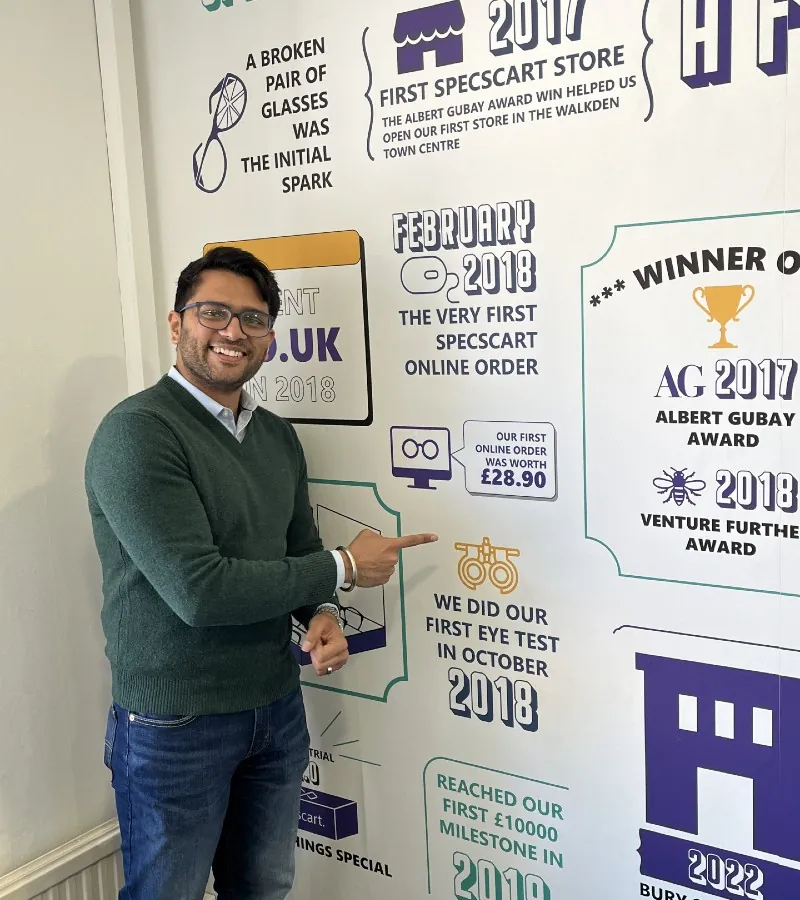
By the time COVID hit, Specscart was primed for serious growth. Sethi had brought production in-house after snapping up £70,000 worth of machines for £8,000 from a company going out of business and the subsequent arrival of optical lab technician Brian Harris, who now oversees quality assurance at the firm by inspecting every pair of glasses which goes out to a customer.
A figure with a quarter of a century of experience in the industry, Harris had begun to feel like he was “doing dishes” in his previous role, according to Sethi, and the pair set out to fulfil orders within 24 hours.
“When you dig deeper into the industry, you learn that it costs just 40p to put anti-glare onto a pair of lenses. So why are [our rivals] charging £40 for this?” asks Sethi.
“And why do we need to sell hardcoated, uncoated and nasty plastic lenses to customers [looking for a lower price point]? We sell quality. You should never sell anything that you wouldn’t buy yourself.”
With an IT office in Delhi now developing the front- and back-end of its expanding eCommerce operation, Sethi tasked them with reverse engineering the machines to make them more efficient.
“Why were we entering someone’s prescription manually on the machines when we already had it on a sheet? Or uploaded to the website? So we jailbroke the software, got that data out, stored it on our server, and started passing it through.
“Our production capacity suddenly skyrocketed. Scan, press the play button… it became that easy.
“It’s our job to keep costs low for the customer by being efficient and taking away the processes. I’ll protect my price with everything I’ve got. Every challenge that is there in the industry, every friction, needs to be attacked with creativity.”
Call of Duty
Specscart, which was featured on our GM Rising Stars of Business list this year, has introduced free home trial kits allowing potential customers to try out several frames and lenses, with a UV pen to test the efficacy of the latter.
“I’m an outsider, so I don’t just look at the optical industry for inspiration. I look at Apple, I then look at DHL. I look at JustEat. What can I bring to this industry from these companies?
“It’s easy to buy a T-shirt online, so why is it complicated to buy a pair of glasses? That’s the challenge I’m looking to solve.”
Describing Specscart’s 28 staff as “a family”, Sethi nevertheless has a keen eye on performance, such as through Call of Duty-style gamification around in-store sales.
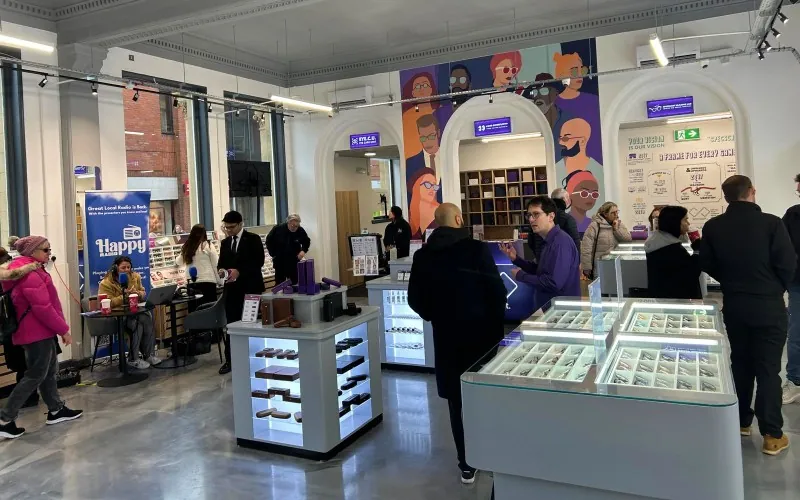
“I spend 90% of my life in this office, and I want to be surrounded by those people who excite me to come into this office,” he says. “A lot of business owners say that they work for themselves; but no, you work for your team – because their growth is your responsibility. Their bills are your responsibility.
“We have found particular success when recruiting through recommendations, while we have also given care leavers and school leavers a chance to build with us.
“I hire very, very slowly, and I fire quickly. Why should it be taken in a negative way? If someone’s not right, you just have to be up front about it. Don’t carry it on so it becomes ugly.”
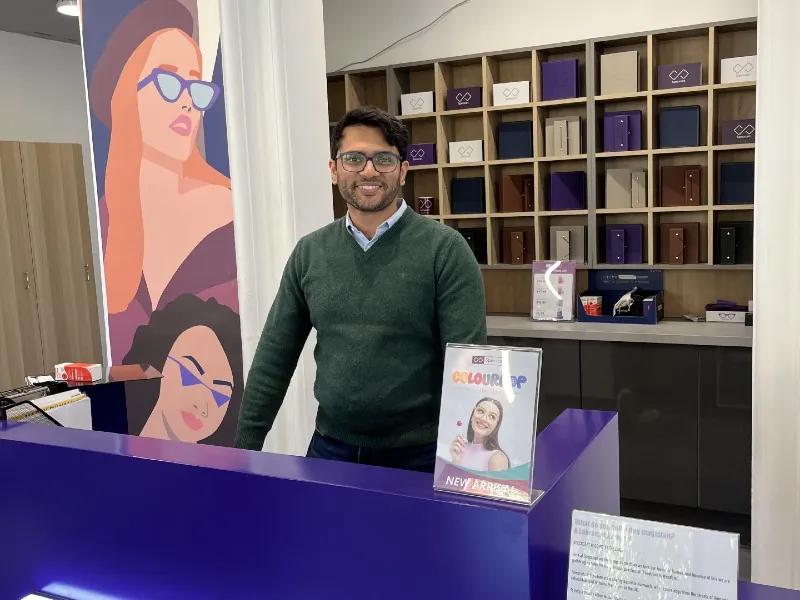
The gaming analogy extends to entrepreneurship. “If I am at a particular level, I know that it’s only going to get harder,” says Sethi. “But if I don’t learn level one, then I’ll probably not be able to survive level two or level three.
“I struggle to understand it when I see first-time founders raising millions of pounds in funding. I’m like: ‘Have you even started selling?’
“The mentality needs to change. You have to go all in and live and breathe the thing that you are working towards; if you believe in your dream, then all the problems you encounter are fixable.”
Sethi’s dream was once to open hundreds of stores. But over time, he began to understand that having so many locations would make them extremely hard to manage, while also taking away control of the customer experience.
He may expand his portfolio of three stores next year, but first he plans to launch a dotcom website in the US, which is already responsible for 25% of its traffic, before going into the Middle East. “Because we make the glasses over here, rather than China, we’re bulletproof from any Trump tariffs.”
ASCEND
Specscart was a star of GM Business Growth Hub’s first ASCEND Scale Up Programme, which saw Sethi build long-lasting relationships with two dozen other Manchester tech businesses as well as its mentors.
“I have regular meetings with Dr Howard Simms, while I chat regularly with Dr Vikas Shah on WhatsApp,” he says of his mentorship with the exited entrepreneurs.
“I didn’t just focus on the mentor that I was assigned. I thought to myself: ‘When will I again get this opportunity for training from geniuses in their own realms and use it in my business?’
“It’s been fantastic.”
Before I take my leave of Sethi and browse for some new specs, I joke that this champion of the friendly neighbourhood Spider-Man is in fact drinking from a Batman bottle.
“Batman’s my favourite superhero really,” he laughs. “Although probably not a good look for a business!
“I want to make Specscart into the world’s number one eyewear business – and I’ll die trying.”


